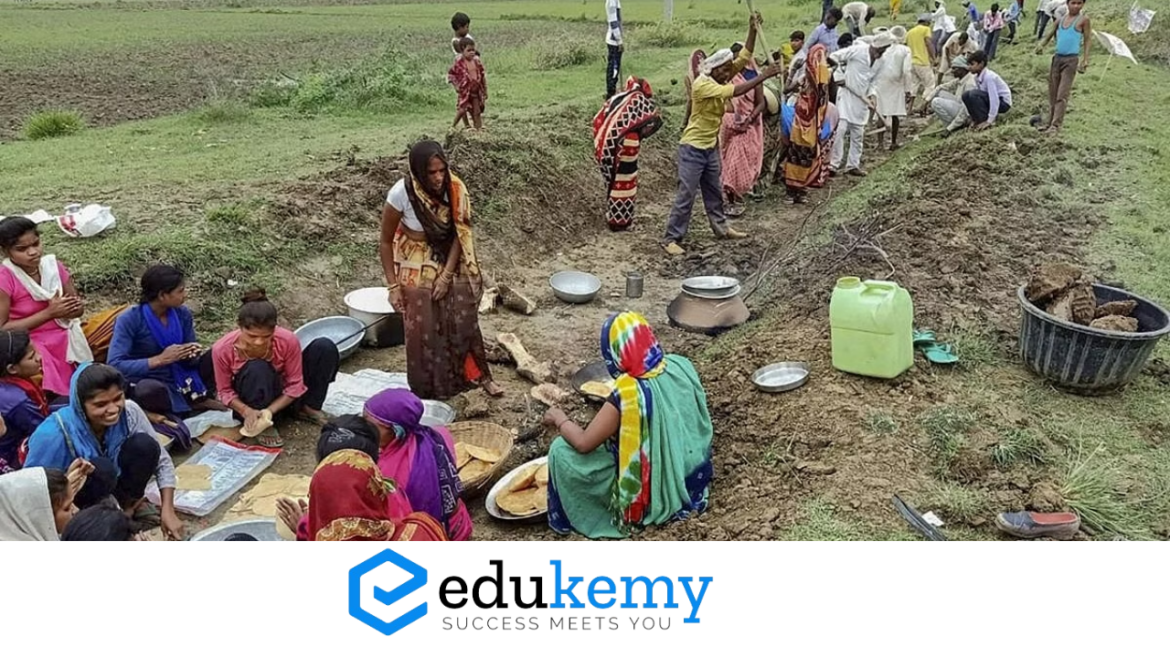
The Mahatma Gandhi National Rural Employment Guarantee Act (MGNREGA), launched in 2005 by the Ministry of Rural Development, stands as one of the world’s largest work guarantee programs. Envisioned to alleviate chronic poverty, this act focuses on providing legal rights to work and ensuring equitable opportunities for rural households.
Contents
- 1 Key Objectives:
- 2 Scale and Impact:
- 3 Legal Right to Work:
- 4 Demand-Driven Scheme:
- 5 Decentralized Planning:
- 6 Some of the key features of the MGNREGA Act, 2005 include
- 7 Frequently Asked Questions
- 7.1 1.What is the Mahatma Gandhi National Rural Employment Guarantee Act (MGNREGA)?
- 7.2 2.How does MGNREGA benefit rural communities in India?
- 7.3 3.Who is eligible to participate in MGNREGA schemes?
- 7.4 4.What types of work are undertaken under MGNREGA?
- 7.5 5.How does MGNREGA contribute to rural development and poverty alleviation?
- 8 In case you still have your doubts, contact us on 9811333901.
Key Objectives:
The primary objective of MGNREGA is to guarantee 100 days of employment in each financial year to adult members of rural households willing to engage in public work-related unskilled manual labor. This ambitious program strives to empower rural communities through gainful employment and addresses the root causes of persistent poverty.
Scale and Impact:
As of the fiscal year 2022-23, it boasts an impressive participation base, with 15.4 crore active workers benefitting from the program. The scale of the initiative underscores its significance in transforming rural employment dynamics across India.
Legal Right to Work:
Unlike its predecessors, MGNREGA is anchored in a rights-based framework, providing a legal entitlement to work for rural adults. To uphold gender equality, the act mandates that at least one-third of the beneficiaries must be women. Furthermore, wages are legally bound to align with the statutory minimum wages specified for agricultural laborers under the Minimum Wages Act, 1948.
Demand-Driven Scheme:
A distinctive feature of MGNREGA is its demand-driven approach, ensuring that any rural adult can secure work within 15 days of making a demand. Failure to meet this commitment necessitates the provision of an ‘unemployment allowance.’ This unique design empowers individuals to self-select into the program, promoting inclusivity and fair access.
Decentralized Planning:
MGNREGA places a strong emphasis on decentralization, providing a significant role to Panchayati Raj Institutions (PRIs) in the planning and execution of public works. The act mandates Gram Sabhas to recommend and prioritize the works to be undertaken, with at least 50% of the projects executed by them. This decentralization strategy enhances community involvement and ensures that local needs are accurately addressed.
Some of the key features of the MGNREGA Act, 2005 include
- Eligibility Criteria: For receiving the benefits of the MGNREGA Scheme, the following eligibility criteria are to be met by the applicant:
- Citizen of India
- 18 years of age at the time of application
- Rural Household
- Willing to do unskilled work
- Guaranteed Employment: The MGNREGA program guarantees 100 days of unskilled employment to all willing rural citizens, at the government-set minimum wage.
- Unemployment Allowance: If work is not assigned within 15 days, the applicant is entitled to receive an unemployment allowance. This allowance is 1/4 of the minimum wage for the first 30 days and a half for the following period.
- Social Audit: A social audit is a powerful tool for social transformation, community participation, and government accountability. Section 17 of the MGNREGA has mandated a social audit of all the works executed under the MGNREGA.
- Preference of employment near residence: The work provided is usually within a 5 km radius of the applicant’s village, with a travel allowance provided for work beyond this radius.
- Decentralized planning: Panchayati Raj Institutions take the lead role in planning, implementing, and monitoring the allocated and executed works. Gram Sabhas are given the authority to suggest work and are required to carry out at least half of the work.
- Implementing agencies are responsible for providing proper working conditions, medical facilities, and compensation.
- Payments are made on a weekly basis and cannot be delayed more than 15 days, with compensation for delays. Complaints can be made and must be addressed within 7 days.
Frequently Asked Questions
1.What is the Mahatma Gandhi National Rural Employment Guarantee Act (MGNREGA)?
MGNREGA is a social welfare scheme enacted by the Indian government to guarantee the right to work and ensure livelihood security in rural areas.
2.How does MGNREGA benefit rural communities in India?
MGNREGA provides rural households with 100 days of guaranteed wage employment per year, fostering economic stability and reducing poverty.
3.Who is eligible to participate in MGNREGA schemes?
Any adult member of a rural household willing to undertake manual work is eligible to register for MGNREGA employment.
4.What types of work are undertaken under MGNREGA?
MGNREGA projects typically include activities such as water conservation, rural infrastructure development, road construction, and land development.
5.How does MGNREGA contribute to rural development and poverty alleviation?
MGNREGA generates employment opportunities, enhances rural infrastructure, improves agricultural productivity, and ultimately uplifts the standard of living for rural communities, thereby contributing to poverty alleviation and sustainable development.
In case you still have your doubts, contact us on 9811333901.
For UPSC Prelims Resources, Click here
For Daily Updates and Study Material:
Join our Telegram Channel – Edukemy for IAS
- 1. Learn through Videos – here
- 2. Be Exam Ready by Practicing Daily MCQs – here
- 3. Daily Newsletter – Get all your Current Affairs Covered – here
- 4. Mains Answer Writing Practice – here

